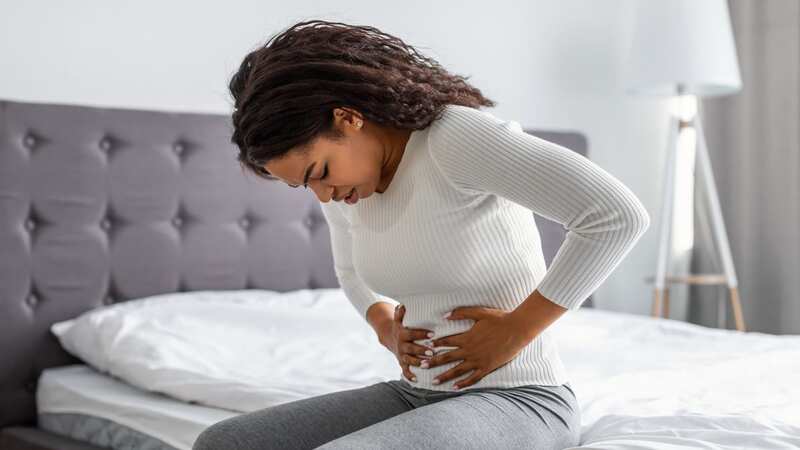Neuroscientist's four ways to settle painful PMS symptoms

Around 20 percent of women experience premenstrual syndrome (PMS) symptoms severe enough to affect their work and social life, which can be both physically and mentally exhausting.
PMS describes the symptoms women experience in the weeks before their period. The condition has been closely linked to hormonal changes that occur during the menstrual cycle.
Hormones oestrogen and progesterone fluctuate throughout the month, with the second half of the cycle seeing increased levels of progesterone and decreased oestrogen, which may contribute to PMS symptoms.
Want to get the latest health news direct to your inbox? Sign up for the Mirror Health newsletter
Neuroscientist Valerie Stark McQuillan told the Mirror: “The interplay between these hormones and their intricate effects on neurotransmitters and receptors in the brain influences mood, behaviour, and physical sensations."
 A twitching eye can sometimes be serious - signs, symptoms and when to see a GP
A twitching eye can sometimes be serious - signs, symptoms and when to see a GP
Some studies suggest that serotonin levels may fluctuate during the premenstrual phase, contributing to mood disturbances and behavioural changes. The women’s health expert added that lower serotonin levels have been associated with increased irritability, depression, and anxiety commonly experienced during PMS.
She said: “This intricate interplay between hormones, neurotransmitters, and their receptors in the brain contributes to the emotional and behavioural symptoms of PMS.”
Research has found that the immune system and inflammatory responses may play a role in the development of physical symptoms associated with PMS, such as breast tenderness, bloating, and headaches. McQuillan said that increased levels of inflammatory markers and altered cytokine levels have been observed in women experiencing PMS.
A more extreme form of PMS can be seen in five to eight percent of women and is known as Premenstrual Dysphoric Disorder (PMDD). The Mayo Clinic explains: “Although PMS and PMDD both have physical and emotional symptoms, PMDD causes extreme mood shifts that can disrupt daily life and damage relationships.”
Symptoms of PMS
Symptoms of PMS usually begin seven to 10 days before your period starts and continue for the first few days of your period, writes the Mayo Clinic. According to the NHS, the most common symptoms of PMS include:
Mood swings
Feeling upset, anxious or irritable
Tiredness or trouble sleeping
Bloating or tummy pain
Breast tenderness
 'Half-moon' shape seen in eye could signal condition leading to a heart attack
'Half-moon' shape seen in eye could signal condition leading to a heart attack
Headaches
Spotty skin
Greasy hair
Changes in appetite and sex drive
The Mayo Clinic highlights that it is common for women with PMDD to suffer from at least one of these emotional and behavioural symptoms listed below:
Sadness or hopelessness
Anxiety or tension
Extreme moodiness
Marked irritability or anger
 Symptoms of PMDD can include sadness or hopelessness (Getty Images/iStockphoto)
Symptoms of PMDD can include sadness or hopelessness (Getty Images/iStockphoto)How to alleviate PMS
McQuillan said: "As of yet, there is no magic pill that can cure PMS for good. But it can be effectively controlled with lifestyle changes, dietary adjustments, and certain therapies."
Lifestyle habits that could reduce PMS symptoms can include:
Being more physically active
Eating a balanced diet
Reducing stress levels
Good-quality sleep
“Light to moderate physical exercises will help boost your energy levels and improve your mental well-being. Balanced eating habits will minimise symptoms like bloating and food cravings, and during the time PMS hits, it might be beneficial to eat a few smaller meals frequently rather than eating two to three larger meals,” the expert said.
McQuillan added: "Trying yoga, meditation, or mindfulness exercises to reduce stress and calm your mood is always a good idea. It is also important to break bad habits such as smoking and excessive alcohol consumption as they may worsen your symptoms."
She also recommends taking supplementary additions that could help improve PMS symptoms, adding: "Studies have found that women who experience PMS have low blood calcium levels. Calcium supplementation has been shown to improve symptoms such as fatigue, appetite changes, and depression in women who suffer from PMS."
The neuroscientist said that magnesium levels have been shown to change throughout the menstrual cycle, and magnesium deficiency has been found in women with PMS. “Magnesium supplementation effectively decreased symptoms such as food cravings, depression, anxiety, and pain-related symptoms. Researchers propose that these benefits arise due to the muscle-relaxing effects brought about by magnesium."
Other supplements recommended by McQuillan include:
Vitamin B6
Vitamin D
Vitamin E
Chasteberry extract
Lemon balm extract
"By taking control of your lifestyle habits and exploring natural supplements, you can effectively manage and alleviate the symptoms of PMS," said McQuillan.
Neuroscientist and specialist in women's health Valerie Stark McQuillan is the director of Novomins.
Read more similar news:
Comments:
comments powered by Disqus
































